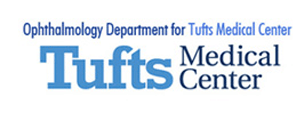Do you suffer from itchy or inflamed eyes? Your eyes may feel itchy, inflamed, and irritated for several reasons.
One common cause is allergic conjunctivitis, the medical term for eye inflammation caused by allergies. Allergic conjunctivitis is especially common in people with allergies to pollen, pet dander, and other airborne allergens.
Sometimes, allergic conjunctivitis can make your eyes feel drier than they should. But you may have dry eyes for a different reason.
Many factors can trigger dry eyes. You may even have allergic conjunctivitis and dry eyes simultaneously for different reasons.
But how do you know what’s causing your eye irritation, and what can you do about it? Keep reading to learn more about the difference between dry eyes and allergy symptoms and how to treat them!
What Makes Your Eyes Dry?

You may understand what causes allergic conjunctivitis, but what about dry eyes? Your eyes become dry when your eyes aren’t producing tears correctly.
You can’t produce enough tears due to an imbalance in the components of your tears. Your tears have three layers:
- The inner layer is mucus
- The middle layer is water (also called aqueous)
- The outer layer is oil (also called lipids)
When your tears lack enough of one component, it affects how well they can moisturize your eyes, leaving them feeling dried out and irritated. Temporary environmental conditions may trigger your dry eyes.
Dry air, improper contact lens use, and dehydration can all affect your tear production and the dispersal of tears across the surface of your eye. Usually, when these environmental factors are corrected, your dry eye symptoms will go away.
But it may be because you have dry eye syndrome when they don’t. Dry eye syndrome is often most common in older patients and women, especially pregnant women and women going through menopause. Dry eye syndrome is also associated with inflammatory skin conditions like rosacea and blepharitis (eyelid inflammation).
But the only way to know what’s causing your dry eyes and if you have dry eye syndrome is to see your eye doctor. However, there are symptoms you can look out for to get an idea about whether or not you’re experiencing allergic conjunctivitis, dry eyes, or both.
Dry Eye Symptoms
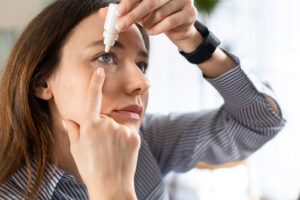
The most common dry eye symptoms include:
- Burning
- Stinging
- Redness
- Tearing
- The feeling of grit in the eye
- Itchiness
Many, if not most, of these symptoms, overlap with symptoms of allergic conjunctivitis. So what can you do to tell them apart? It all has to do with what your primary symptoms are.
Dry Eyes vs. Allergies
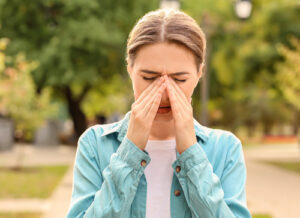
Allergic conjunctivitis and dry eyes have similar symptoms. However, dry eyes tend to burn and sting much more than they itch.
If you have eye allergies, the primary symptom is usually very itchy eyes. If you have dry eyes, they may feel a little itchy, but more than anything, you’ll usually experience burning.
Having grit in your eyes is also a common sign of dry eye rather than allergies. Now, it is possible to have both dry eyes and eye allergy symptoms.
In that case, you may experience very itchy eyes that also burn. The burning and feeling of grittiness only worsen the more you rub your eyes.
Rubbing your eyes will exacerbate both your dry eye and allergy symptoms. If this describes your symptoms, you should first do your best not to rub your eyes at all!
Then, regardless of which symptoms you have, you should see your ophthalmologist at New England Eye Center as soon as possible for diagnosis and treatment.
Treating Eye Allergies and Dry Eyes
The best treatments for allergic conjunctivitis are often the most straightforward things available. Over-the-counter antihistamines usually do the trick.
If you have severe allergies, you may need prescription medication. But if your dry eyes make your allergic conjunctivitis worse, the best treatment is a combination of allergy medication and dry eye treatment.
When you’re diagnosed with dry eyes, there are several treatments that your eye doctor may recommend.
At-Home
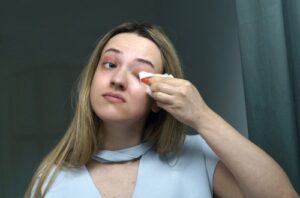
First, your ophthalmologist will likely recommend treatments you can do at home. These include over-the-counter artificial tears, nutritional supplements to aid in tear production and proper lid hygiene.
Lid hygiene is beneficial if you have blepharitis; it can lower inflammation by keeping your lids clean and bacteria-free. Your eye doctor may recommend a simple wet compress over your eyes or a lid scrub or wipe.
While you can do all these treatments independently, it’s best to consult with your eye doctor for a proper diagnosis and ask what they recommend first.
Prescription Medications
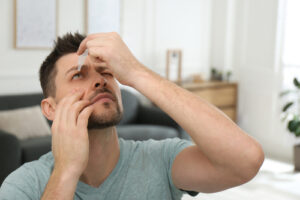
Certain prescription eye drops may help aid tear production. At New England Eye Center, we can prescribe Restasis, which lowers inflammation and encourages tear production. We also can prescribe steroid eye drops.
Punctal Occlusion
Your puncta are the tiny tear ducts located right in the corner of your eye closest to your nose. Your tears naturally drain through the puncta.
By blocking them off through punctal plugs or punctal cautery, your tears are forced to stay on the surface of your eye longer, compensating for poor tear quality.
In-Office Therapy
At New England Eye Center, we offer a revolutionary dry eye treatment called Optima IPL. This in-office treatment is non-surgical and entirely noninvasive.
Optima IPL is an excellent treatment for evaporative dry eye, which occurs when your tears lack their outermost protective layer, causing them to evaporate too quickly. Gentle heat and light soften blocked oil glands, encouraging better lipid flow so your tears have more of their protective layer.
Do you need to treat dry eyes and eye allergies? Find out what treatments may work best for you by scheduling an appointment at New England Eye Center in Boston, MA!




